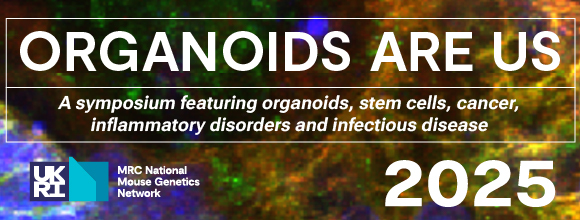We are co-organising Organoids Are Us 2025. Register now!

The MRC National Mouse Genetics Network, in collaboration with the Cancer Research UK (CRUK) Scotland Institute, is organising Organoids Are Us 2025, a symposium that incorporates both basic and clinical/diagnostic research and will be a significant national and international forum for exchange of new data and a “progress report” on the application of organoid-based technologies.
This year’s venue will be the CRUK Scotland Institute in Glasgow from Tuesday 23rd to Friday 26th of September and will be the 7th since the meeting was first held at the Doherty Institute in Melbourne in 2018, the name having been coined by Prof Elizabeth Vincan at the time. The Glasgow meeting this September will be the first to be held in Europe!
Plenary, Keynote and Symposium sessions, including rapid-fire short talks and poster sessions, make up the programme, which includes many well-known international speakers.
Early bird registration closes on the 15th of June and includes discounted rates for students.
Organisers are very excited to be hosting this meeting, where cutting-edge technologies meet unanswered biological and clinical questions.
Prof Elizabeth Vincan, Clinical Scientist and Medical Researcher in the Department of Infectious Diseases, Melbourne Medical School, University of Melbourne says: “Organoids Are Us brings together delegates from diverse fields and disciplines to show case and learn about the latest advances in organoid technology, and its application to fundamental and clinical research to fast track discovery and translation. This is the seventh conference in this highly successful series, and the first in the UK.”
Prof Ramanuj DasGupta, Professor of Cancer Systems Biology at the School of Cancer Science, University of Glasgow and CRUK Scotland Institute says: “The Organoids Are Us conference aims to bring together the key opinion leaders in the fields of cancer, infectious disease and regenerative biology, who utilise organoid models to address key questions in human disease biology and development of novel therapies.”